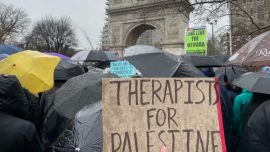Heavy rain pours onto a sea of umbrellas in New York City’s Washington Square Park. It is 1pm on Saturday, March 2, and despite the pouring rain, protesters are out in force.
They carry placards and banners calling for a ceasefire and end to violence in Gaza. One sign covered in plastic reads “End the occupation of Palestine.” Another poster, its ink dripping from the rain, states: “There are no ‘two sides’ to genocide.”
The anger on the streets is palpable. Many US citizens have criticised US President Joe Biden’s approach to the conflict in the Middle East. There has been criticism of funding and the sending of aid.
Above all, there is rage at the death toll: over 30,000 people have been killed in Gaza since the October 7 attack by Hamas by Israeli weapons and starvation.
“I think [public support for Palestine] is so needed, especially in the US, the US being the biggest culprit and most complicit in what’s happening in Gaza and Palestine,” said Zehra Mirza, 33, Senior Director of Planning and Evaluation at Amnesty International.
Israel has been the largest progressive recipient of US foreign military aid since World War II, with over US$3 billion annually sent in the past few years. In November, Washington also approved a US$14.5-billion military aid package to Israel.
The same day as the protesters demonstrated, Biden announced that the US would airdrop 38,000 meals of food aid into Gaza — US$53 million in additional humanitarian assistance. Over the past 30 years, the US government’s Agency for International Development (USAID) has provided more than US$7.6 billion in assistance to Palestinians in the West Bank and Gaza.
With domestic pressure growing, US Vice-President Kamala Harris has recently begun calling for an “immediate, temporary ceasefire” in Gaza and the exchange of Israeli hostages for Palestinian prisoners.
Those demonstrating in the rain, however, are urging a permanent ceasefire.
“I’m Jewish, I’ve been to Palestine, I’ve seen the horrendous things that they have been doing to people and I can’t stand it anymore. I’ve seen this for 75 years and I’m terrified,” 80-year-old protester Julie Schwartzberg told the Times.
“The only thing that I feel positive about is all the young people who get it and understand what’s being done by the [Israeli Prime Minister] Netanyahu administration,” said Shwartzberg, a retired public health official.
With the US heading into election season ahead of the 2024 November presidential ballot, the crisis in the Middle East could affect Biden’s re-election chances.
“Don’t vote for these horrible governments who are supporting this in one way or another,” cautioned Schwartzberg in the context of Donald Trump's presidential candidacy. She later clarified: “I support the uncommitted movement in the primaries [elections], but I'm not saying people shouldn't vote for Biden in the general election."
“Biden’s responses have been terrible, he’s been funding this genocide and trying to act like he isn’t,” agreed 33-year-old Connie Franco, as she handed out flyers for the Party for Socialism and Liberation.
Franco, who mentioned she would support socialist candidate Claudia de la Cruz in the election, said the president “does not have my vote.”
“I just want to be a body, add volume to the protests, add a voice,” said student Nora Dillon.
“Genocide is bad, what’s happening in Gaza is bad,” said 22-year-old bluntly. “I want my government that I pay for and vote for to recognise my feelings and my other constituents' feelings.”
While some at the rally outwardly showed their support for Palestine, wearing resistance symbols like the keffiyeh and signs with watermelon symbols, others were reluctant to speak publicly.
Two co-workers in their late 20s, who asked to remain anonymous, told the Times that, when voicing views over Israel and Palestine, there are risks involved. Both women, who work as educators in New York, wore masks to hide their identities from cameras.
“People were suspended for personal posts” vocalising opinions about the crisis in the Middle East, said one of the women.
“I spend almost everyday crying about this,” said the other.
Across the United States, there are similar feelings on both sides. With temperatures running high on social media, and the streets, many Muslim-Americans and Jewish-Americans feel under threat.
But as the war in Gaza enters its fifth month with ongoing bloodshed, the number of protests for peace in the United States are undoubtedly growing.

















Comments